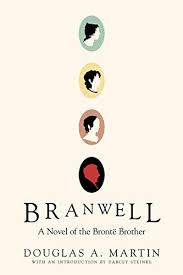Darcey Steinke at The Paris Review:
 “I see no reason not to consider the Brontë cult a religion,” writes Judith Shulevitz. She calls the thousands of books inspired by the Brontës midrash, “the spinning of gloriously weird backstories or fairy tales prompted by gaps or contradictions in the narrative.”
“I see no reason not to consider the Brontë cult a religion,” writes Judith Shulevitz. She calls the thousands of books inspired by the Brontës midrash, “the spinning of gloriously weird backstories or fairy tales prompted by gaps or contradictions in the narrative.”
Martin’s Branwell dilates one such gap: the “unspeakable acts” Branwell was said to have committed at Thorp Green. In both Daphne du Maurier’s 1962 The Infernal World of Branwell Brontë and Martin’s book, Branwell’s claim of an affair with his employer’s wife, Mrs. Robinson, is seen as a screen for a homosexual liaison. The scholar Richard A. Kaye calls Branwell a queer speculative biography. He suggests that “queering the Brontës often involves an imaginative disregard for the available evidence regarding Brontë’s family secrets in order to take advantage of unresolved biographical cul-de-sacs.”
more here.
